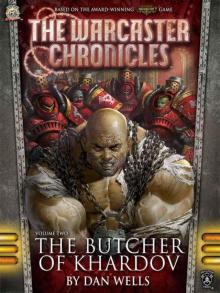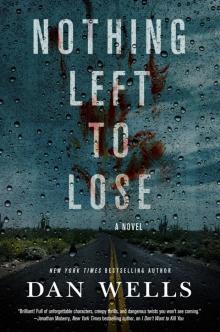The Butcher of Khardov Read online
Page 2
“Trees, yes,” said Aleksei, “but customers? Where am I supposed to find more of those if Molonochnaya starts buying from somebody else? And what about the villages east of them—am I supposed to give up their business, too? I’m barely paying the bills as it is, Jack. If I lose them I’ll have to make some painful cuts to the labor force. No pun intended.”
Orsus bristled at being called Jack again, but Aleksei’s subtle threat overshadowed his irritation almost immediately. He glared at the small man. “You’re talking about letting me go?”
“I might have to let a lot of people go—”
“I do the work of any two other men in this crew,” Orsus hissed, “and you’re talking about sending me away because I won’t break some poor villager’s legs for you?”
“Sending you away from what?” Aleksei said, his thin voice thick with indignation. “With a new logging company starting in Molonochnaya I’ll lose buyers, I’ll lose revenue—I’ll lose the whole business. I don’t want to let anybody go, you know that, but without a proper business to support us I won’t have any other options.”
“So you’re forcing me to help you, or I lose my job.”
Aleksei frowned, his mock indignation blossoming into mock righteous anger. “Your job? Such grotesque selfishness! This is bigger than your job and my job and anyone’s job. This business employs half our village, which means it feeds half our village, which means you’ll be taking the food right out of their mouths.
“When you hear there’s a new logging company, you shouldn’t balk, you shouldn’t stand there like a schoolboy. You should be running to Molonochnaya to break their legs without ever being asked. I’m not forcing you to do anything, Orsus. I’m guiding you.” He gestured at the two village boys, hacking self-importantly at the branches of another fallen tree. “I’m guiding them. I’m making sure nobody does anything stupid and gets themselves hurt. We go together, or not at all.”
“Not at all,” Orsus said.
“And you wonder why they call you Jack.” Aleksei shook his head and tsk-tsked. “Heartless as an empty boiler.”
Orsus had heard this all before—the taunts, the pleading, the threats. Aleksei was ambitious and cruel, but he lacked imagination, and his arguments followed the same spiraling path toward his own interests—the only end that mattered to him. He’d appealed to Orsus’ sense of goodness, a quality Aleksei did not himself possess, and now that it hadn’t worked he’d appeal to something he was more familiar with: greed. Orsus nodded as Aleksei continued.
“I’m bankrupt if you don’t come, but if you do? There’s a bonus in it for you.” He jingled his coin purse. “A month’s wages, paid on completion of the job. I’ve never been so generous in my— Why are you laughing?”
“Because you’re small-minded and predictable.”
“Says the axe to the arm that swings it. If you’re so much grander than I am then why don’t I work for you, Your Majesty, instead of the other way around?”
“I only work for you until I’ve saved enough to buy a shop,” said Orsus. “I’ve told you that before.”
“Ah, yes,” said Aleksei, “the great bear of the woods carving bread boards for a living, or little wooden suns to hang over the door. And I’m small-minded? Look at you—you’re a walking mountain. I’ve never seen a man more suited to violence in my life, and I trust you know enough about my life to appreciate what that means. You don’t belong in a wood shop, Orsus, you don’t even belong in this village. Do you know how much I weep at night for the potential you’re throwing away? You could have wealth, you could have power. If I had your strength and strategy I’d rule this whole valley, and all you’ve done with it is cut down a few trees. It’s a waste.” He jingled his coins again. “If you’re not willing to make something of yourself, at least make some money. Think how much closer you’d be to that shop with a whole month’s wages in your pocket.“
“A month closer,” Orsus said. “I can wait.”
“Then you’re as brainless as a ’jack as well!” Aleksei shouted, and Orsus knew the argument had spiraled down to its low, grimy center. “Think of everything I’ve done for you! Everything I’ve given you, and this is how you repay me? I gave your father a job when the rats destroyed your cellar, and I gave you a job when the Tharn destroyed your father. Who was it that paid off the officials to keep your name off the conscription census? Without me you would have been in the Winter Guard and got yourself shot somewhere. I taught you how to work, I taught you how to fight, I taught you how to stand up for yourself, and all you can do is throw it back in my face? What do you own that wasn’t bought with my wages? What do you have that doesn’t come directly from me?”
And Orsus smiled, because he had the most wondrous thing in the world. “I have her.”
“A girl? I can get you girls.”
“Not like Lola.”
“Better,” said Aleksei. “Girls so beautiful you’ll forget this Lola ever existed.”
“I’ve seen your girls, Aleksei, and Lola puts them all to shame.”
“Fine, then.” Orsus watched warily as the weaselly man spoke. The conversation was going in a new direction. “Say she’s the most beautiful girl in the world, the best cook, the best lover, whatever it is you value in a woman—”
“The kindest,” said Orsus, “the bravest, the smart—”
“The most annoying, then. Whatever she is, it doesn’t matter. You’re still a backwoods mountain boy without a penny to his name, without a horse to call his own, with a leaking roof and a bed of straw and a knife and fork you carved yourself from scraps.”
“All true.”
“And you think your girl wants that? Come back to me—come back to the bratya. There’s money in this business, Orsus, but you won’t find it chopping logs like one of these idiots.” He gestured at the other workers. “You and I together, we can be rich—richer than you’ve ever dreamed. You can give your Lola a real house, with porcelain plates, a velvet dress—can you imagine her in velvet? In silk? She should have jewels in her hair, Orsus, and you can give them to her.”
Orsus could imagine it—he didn’t want to, but he could, and he had, and now the vision was already there in his mind and he burned to make it real. She deserved all those things and more, so much more, and a trip now and then to Molonochnaya, or Telk, or Chaktiz . . .
Orsus shook his head, and the vision collapsed. “No.” He hefted his axe and turned back to the tree. “That’s not the kind of potential I want to live up to.”
Aleksei’s voice was sharp as a blade. “Then maybe you really are no better than a ’jack.”
Orsus looked at him, counting slowly in his head, restraining himself from breaking the man’s sneering face. He dropped his axe, walked to the fallen log, and stood over it, calculating. The village boys backed away in surprise, and the other loggers grew silent. In years of teasing, Orsus had never actually gone for it.
He estimated the weight in his head, gauging the balance, pinpointing where to put his hands. He took a breath, crouched low to get his hands under it, and lifted. The tree rose, wood chips and pine needles cascading down as the twenty-foot log crept into the air. He walked carefully, deliberately, gritting his teeth with the effort, straining to hold on, until finally he dropped the tree wordlessly into the pile with the others. He stared down at it, panting, surprised even at himself, and walked back to his axe.
“Forget the bratya,” Aleksei said. “A man like you should be a warlord.”
“No more fighting,” Orsus said.
“But why?”
“Because she doesn’t want me to. And I never will again.”
Simonyev Blaustavya, great vizier of Khador and chief advisor to Queen Ayn Vanar XI, knelt before her throne, bowing his head low before the young ruler. He had served the royal family for much of his life, including as lord regent during Ayn’s minority. The new queen—inexperienced as she may be—was like a daughter to him. She deserved all the same respect that her ances
tors had, and even more of the same protection.
“Forty Winter Guard behind the prisoner,” said Simonyev, “and six of our most decorated combat veterans in Man-O-War armor to surround him directly. They will be holding the chains. We will have ten Iron Fangs in a rank before you, here, armed with pikes to keep him from getting too close—”
“Man-O-War armor,” the queen said, “in the palace throne room?” Her voice was soft, but Simonyev thought he heard—as he often did lately—a deeper current of independence in her voice. It would have been a welcome sign in a more experienced ruler, but in a young and untested one . . .
No, he told himself, I must not think such thoughts. She is inexperienced, but she is more than ready for responsibility. She is not a girl, but a queen. I’ve been training her for this for years.
“Man-O-War armor is indeed unconventional in the palace, Your Majesty, and runs some risk of damaging the mosaic tiling your grandfather installed here. However, your life is of paramount importance, and if we must crush priceless artwork to protect you then we will crush priceless artwork. Unless you have reconsidered my suggestion to conduct this interview from the balcony, with the prisoner bound safely in the courtyard?”
“I will address the prisoner in here, as I do with all kommanders accused of treason. It is my duty, is it not?”
“Your duty requires only that you address them. Addressing them in the throne room is merely a tradition.”
“But traditions are important. I have heard you say so yourself many times. We have a throne room filled with art, both commissioned and conquered, because it impresses upon our visitors the wealth and power of our nation. Surely a trained warcaster turned traitor to the Motherland should be reminded of those qualities even more strongly than the average visitor.”
Simonyev kept his face serene, but inside his pride was battling with his nerves. She was showing all the strength of character he had hoped to see in her, but it could get her killed. “That is wise, Your Majesty,” he said with a bow, “but if you will forgive my failure, perhaps I have not fully explained to you the nature of the prisoner you are addressing today. He is a monster.”
“All traitors are.”
“In their souls, perhaps. This man is a monster in physical form, with no soul to speak of. He stands a full head taller than your tallest guard. His chest is as broad as a bear’s, and his arms and legs are thick as tree trunks. He is bound in the same heavy chain the dockworkers use to lift warjacks onto cargo boats—nothing less will hold him, and nothing less than a Man-O-War can hold those chains. I assure you, Your Majesty, the Man-O-Wars are not excessive force, they are a bare minimum necessitated by the size of that doorway.” He pointed to the throne room’s arched stone entrance. “If we were anywhere else, if you would allow us to hold this judgment in any other venue, I would have him flanked by Juggernauts at least.”
The young queen mused over this, cocking her head in a manner reminiscent of her late father. He would have listened to reason, thought Simonyev. Morrow save us from headstrong children.
“My grandfather also commissioned many rugs and tapestries,” said the queen. “Lay them on the floor, as thickly as you can stack them, and let the Man-O-Wars walk upon that.” She smiled. “Naturally, you will clean their feet first.”
Simonyev bowed, a gesture that allowed him to close his eyes in silent frustration. “If you wish, Your Majesty.”
He began calculating how many rugs he could gather and how many layers he could lay if he stretched a path from the throne room to the door. He might be able to do it, and it might actually help preserve the floor, though certainly at the expense of whichever rug came in direct contact with the Man-O-Wars’ metal tread, cleaned or not. And if the prisoner tried to escape or—Morrow forbid—to assault the queen, the floor would be ruined regardless and the rugs destroyed in the bargain.
“We have yet to address the greatest danger,” he said, “which is his arcane skill. Even if he doesn’t move—even if he doesn’t lift a finger—he could kill you with a thought.”
“He will be wearing chains infused with mystic power, specifically designed to negate his connection to magic,” Ayn said. “At least I assume he will. Surely we won’t neglect that aspect of our security?”
Simonyev permitted himself a silent, invisible sigh. Of course she would remember the chains. He had taught her well. “Of course he will, Your Majesty. He will be as unable to work magic as we can possibly make him. However . . . if you will permit me the question, Your Majesty: why is this so important to you?”
“It is my duty, as we have already discussed, and this is the best place for that duty to be carried out.”
“The best in some ways,” said Simonyev, “and the worst in many others. This man represents a very real danger to you, and we cannot protect you properly inside your throne room. Six Man-O-Wars just to hold his chains—have you really thought about what that means? Six Man-O-Wars to hold a single prisoner. Ten Iron Fang pikemen armed with weapons designed to bring down heavy warjacks. Forty Winter Guard, not as an honor guard but as a real fighting force, led by our best kommanders, with orders to shoot him in the back if he so much as twitches. We’ll have Widowmaker snipers in the galleries above you; we’ll have soldiers with heavy iron shields on either side of you, ready to protect you from battle while your personal bodyguard escorts you out the back door. The traitor will be unarmed, unarmored, and bound with arcane chains, and still this morning I ordered ten more Winter Guard to walk in front of him, solely as an obstacle to slow him down if he tries to rush the throne. And this is the most important part: even with all of that, I can’t be sure that it’s enough.
“I should try myself for treason merely for allowing you to go through with this, for it is the most dangerous situation you have ever been—and I dearly hope ever will be—confronted with in your life. A final time, my queen, I beg you: address him in judgment from your balcony, so that he can remain in the courtyard, chained and caged and watched by warjacks. He is not simply dangerous, he is danger personified. He is death and violence in their most terrifying human form. He is an avatar of war.”
The queen seemed to consider this, or perhaps she did not know how to respond. Simonyev couldn’t tell. After a lengthy pause she spoke softly—though not, he noted, contritely. “Tell me again of his crimes.”
“He slaughtered your people, Your Majesty: an entire village and every soldier who attempted to defend them. Some of them under his own command.”
“The Fifth Border Legion,” said the queen.
Simonyev nodded. “It was the village of Deshevek, Your Majesty, near Boarsgate on the Ordic border. There are hundreds dead, as many as half of them by this man’s own hand.”
“And they were traitors as well, were they not? Your report mentioned some evidence that they were planning to secede to Ordic governance.”
“There is indeed some evidence of that, Your Majesty, but that is no justification for a massacre. They should have been given the chance to account for themselves, to confess or disprove the accusation. A proper servant of Khador would have given them a trial, not wanton murder.”
The queen smiled—that sly, maddening smile her grandfather used to give—and Simonyev realized too late that he’d been trapped.
“If traitors deserve a trial,” she said, “then this traitor shall have one. Lay out your rugs, arrange your soldiers, and bring the man to me. I shall address him in judgment as tradition and duty demand. If a kommander has betrayed Khador then he has betrayed me, and I shall be the one to condemn him.”
Simonyev nodded, more determined than ever that the prisoner would not lay so much as a fingertip on the queen. She was even more strong-willed than he’d thought, a fitting heir to the kingdom’s legacy. More snipers, perhaps, he thought, and another Man-O-War to stand at her side with a massive cannon shield. No one could get through that, not even the mighty Orsus Zoktavir.
And then he paused, just for a moment, and felt
himself grow pale. He used to be Orsus Zoktavir, he thought, but no more. After the massacre near Boarsgate the man had a new name, one whispered in halls and alleys, chilling the spines of Ord and Khador alike. He is no longer a kommander, no longer a soldier, no longer a man.
He is a Butcher.
Pyotr Zoktavir slammed the door closed, bracing it with his body as he fumbled for the heavy wooden bar to lock it.
“The Tharn are here!”
Orsus’ mother, Agnieska, cried out in terror, clutching her children close. Normally, Orsus—ten years old and too big for such coddling—would have tried to pull away, but now he was too scared, an instinctual reflection of his parents’ terror. He knew the Tharn from stories, fearsome barbarians who worshiped the Devourer Wurm. All the adults in the village seemed scared of them, but he had never seen them in person before, never really imagined that they were real. The Tharn were the stuff of bedtime stories, boogeymen to make his little sister eat her porridge, and yet here was his father, the largest man in the village, bone-white with fear, slamming the locking brace into place and scrambling past his mother and sister for the door to the old cellar.
“But the rats, Papa,” said Orsus.
A nest of rats had invaded the family cellar the year before—giant, vicious things that devoured their food and settled in and resisted all attempts at eradication. It had cost them nearly a year’s worth of storage and forced Pyotr into debt with Aleksei Badian, and months ago they had sealed the door and given up. Yet now he was prying up the boards, scrabbling at the nails, desperate to get it open.
Realization dawned in little Irina’s eyes, and Orsus’ sister screamed in horror. “We can’t hide with the rats, Papa, you can’t make us do it!”
Orsus’ mother struggled to cover the girl’s mouth, shushing her. “Please, child, please; it will be okay; we’ll protect you from the rats, but you need to be quiet; please, Irina, stay quiet for Mommy . . .” She continued her tender, terrified mantra, and Orsus realized with shock that this was real, that the Tharn were really here, and that his parents were so scared of them that they considered the rats—once the greatest monsters in Orsus’ young life—to be a haven instead of a threat.

 Partials
Partials The Devil's Only Friend
The Devil's Only Friend Isolation
Isolation I Don't Want to Kill You
I Don't Want to Kill You Ones and Zeroes
Ones and Zeroes Next of Kin
Next of Kin Over Your Dead Body
Over Your Dead Body Fragments
Fragments Mr. Monster
Mr. Monster The Butcher of Khardov
The Butcher of Khardov I AM NO T A S E RI AL KI L L E R
I AM NO T A S E RI AL KI L L E R Nothing Left to Lose--A Novel
Nothing Left to Lose--A Novel Active Memory
Active Memory A Pear-Shaped Funeral
A Pear-Shaped Funeral I Am Not a Serial Killer
I Am Not a Serial Killer Bluescreen
Bluescreen Ruins
Ruins Zero G
Zero G The Hollow City
The Hollow City Extreme Makeover
Extreme Makeover Partials p-1
Partials p-1 The Complete John Wayne Cleaver Series: I Am Not a Serial Killer, Mr. Monster, I Don't Want to Kill You, Devil's Only Friend, Over Your Dead Body, Nothing Left to Lose
The Complete John Wayne Cleaver Series: I Am Not a Serial Killer, Mr. Monster, I Don't Want to Kill You, Devil's Only Friend, Over Your Dead Body, Nothing Left to Lose